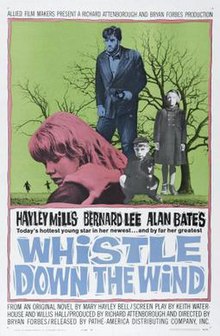Whistle Down the Wind (film)
| Whistle Down the Wind | |
|---|---|
 |
|
| Directed by | Bryan Forbes |
| Produced by | Richard Attenborough |
| Screenplay by |
Keith Waterhouse Willis Hall |
| Based on |
Whistle Down the Wind by Mary Hayley Bell |
| Starring |
Hayley Mills Bernard Lee Alan Bates |
| Music by | Malcolm Arnold |
| Cinematography | Arthur Ibbetson |
| Edited by | Max Benedict |
|
Production
company |
|
| Distributed by |
J. Arthur Rank Film Distributors (UK) Pathé-America Distributing Company Astor Pictures Corporation (USA) |
|
Release date
|
20 July 1961 (World Premiere, London) |
|
Running time
|
99 minutes |
| Country | UK |
| Language | English |
| Budget | £148,000 |
Whistle Down the Wind is a 1961 British film, directed by Bryan Forbes, screenplay by Keith Waterhouse and Willis Hall, from the novel by Mary Hayley Bell and starring her daughter, Hayley Mills.
The plot follows the lives of three Lancashire farm children who discover a fugitive hiding in their barn. The bearded man, referred to as "Blakey" by the police, is mistaken for Jesus Christ by the children, who are influenced by stories they have heard at Sunday school. The fugitive makes no attempt to correct their mistake, especially when he discovers the eldest child, Kathy, is determined to protect him from discovery by the local police. We learn from a poster that he is wanted for murder.
Most of the children in the nearby small town eventually become aware that "Jesus" is living in the barn, complicating Kathy's attempt at keeping it a secret. When the news finally reaches an adult, Kathy's father, the police are called in to apprehend the criminal.
The children of the village, perhaps 100 of them by now in on the secret, converge on the barn. Convinced that she has let Jesus down, Kathy sneaks behind the structure and apologizes to Blakey that she can no longer protect him. He forgives the girl and, after much prompting from Kathy, promises she will see him again. Resigned to his fate, Blakey tosses his revolver out of the barn door and surrenders to the police.
Once Blakey is taken away and the crowd disperses, Kathy is approached by two very young children who ask to see Jesus. She tells them that they missed him this time, but he will be back one day.
The film contrasts the children's innocent faith with the pragmatic and suspicious adults in the town. Heavy in allegory, many of the characters and events parallel those found in historical Christian literature. In one scene, a child is mocked and beaten into denying he had seen Jesus. After the boy's third denial, a train whistle is heard (representing Peter's denial in Luke 22). The strains of 'We three kings' can be discerned in the score as Kathy, her brother and sister march with the food 'gifts' they have acquired for the man in the 'stable'. They are spotted and followed by a group of country children (shepherds). The early core of children who are in on the secret number a dozen and are specifically called The Disciples in the cast list. The secret comes out at the end of a children's party/Last Supper. When the apprehended Blakey is being frisked by police, his posture, with arms outstretched to his sides, is a clear reference to the Crucifixion.
...
Wikipedia
